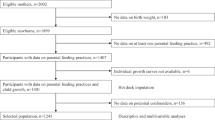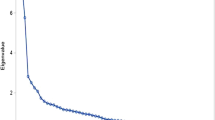Abstract
Background/Objectives:
The aim of this study is to explore mothers’ perceptions of differences between their children in the eating behaviour domain.
Subjects/Methods:
Twelve semistructured interviews were carried out with mothers who had at least two children aged between 6 and 15 years, to discuss feeding experiences, particularly around healthy eating. Interviews were recorded and transcribed verbatim and analysed using Framework Analysis.
Results:
Mothers frequently identified differences in appetite and food preferences between their children, which they attributed largely to genetic factors. These sibling differences meant that although feeding goals might be common, the pathways to the goals varied depending on each child's appetitive characteristics. The overall pattern was one of flexible responsiveness to each child. In contrast to perceptions of their own children's eating behaviours, feeding difficulties in other families were usually attributed to lack of parental control.
Conclusions:
The feeding relationship is complex and interactive, resulting in parents modulating their feeding strategies to match each child's eating behaviour. Guidance to parents on healthy feeding needs to acknowledge the nuanced and interactive nature of feeding practices.
This is a preview of subscription content, access via your institution
Access options
Subscribe to this journal
Receive 12 print issues and online access
$259.00 per year
only $21.58 per issue
Buy this article
- Purchase on Springer Link
- Instant access to full article PDF
Prices may be subject to local taxes which are calculated during checkout
Similar content being viewed by others
References
Baughcum AE, Burklow KA, Deeks CM, Powers SW, Whitaker RC (1998). Maternal feeding practices and childhood obesity a focus group study of low-Income mothers. Arch Pediatr Adolesc Med 152, 1010–1014.
Birch LL, Birch D, Marlin DW, Kramer L (1982). Effects of instrumental consumption on children's food preference. Appetite 3, 125–134.
Birch LL (1998). Development of food acceptance patterns in the first years of life. Proceedings Nutr Soc 57, 617–624.
Birch LL, Fisher JO (2000). Mothers’ child-feeding practices influence daughters’ eating and weight. Am J Clin Nutr 71, 1054–1061.
Birch LL, Fisher JO, Davison KK (2003). Learning to overeat: maternal use of restrictive feeding practices promotes girls’ eating in the absence of hunger. Am J Clin Nutr 78, 215–220.
Birch LL, Marlin DW, Rotter J (1984). Eating as the means activity in a contingency—effects on young childrens food preference. Child Dev 55, 431–439.
Birch LL, Zimmerman S, Hind H (1980). The influence of social-affective context on the formation of children's food preferences. Child Dev 51, 856.
Blissett J, Farrow C (2007). Predictors of maternal control of feeding at 1 and 2 years of age. Int J Obes 31, 1520–1526.
Blissett J, Meyer C, Haycraft E (2006). Maternal and paternal controlling feeding practices with male and female children. Appetite 47, 212–219.
Carnell S, Haworth CM, Plomin R, Wardle J (2008). Genetic influence on appetite in children. Int J Obes 32, 1468–1473.
Cecil JE, Palmer CNA, Fischer B, Watt P, Wallis DJ, Murrie I et al. (2007). Variants of the peroxisome proliferator-activated receptor gamma- and beta-adrenergic receptor genes are associated with measures of compensatory eating behaviors in young children. Am J Clin Nutr 86, 167–173.
Croker H, Sweetman C, Cooke L (2009). Mothers’ views on portion sizes for children. J Hum Nutr Diet 22, 437–443.
Drucker RR, Hammer LD, Agras WS, Bryson S (1999). Can mothers influence their child's eating behavior? J Dev Behav Pediatr 20, 88–92.
Farrow CV, Galloway AT, Fraser K (2009). Sibling eating behaviours and differential child feeding practices reported by parents. Appetite 52, 307–312.
Fisher JO, Birch L (1999a). Restricting access to palatable foods affects children's behavioral response, food selection, and intake. Am J Clin Nutr 69, 1264–1272.
Fisher JO, Birch LL (1996). Maternal restriction of young girls’ food access is related to intake of those foods in an unrestricted setting. FASEB J 10, 1299.
Fisher JO, Birch LL (1999b). Restricting access to foods and children's eating. Appetite 32, 405–419.
Fisher JO, Birch LL (2002). Eating in the absence of hunger and overweight in girls from 5 to 7 y of age. Am J Clin Nutr 76, 226–231.
Fisher JO, Cai GW, Jaramillo SJ, Cole SA, Comuzzie AG, Butte NF (2007). Heritability of hyperphagic eating behavior and appetite-related hormones among Hispanic children. Obesity 15, 1484–1495.
Fisher JO, Mitchell DC, Smiciklas-Wright H, Birch LL (2002). Parental influences on young girls’ fruit and vegetable, micronutrient, and fat intakes. J Amer Diet Assoc 102, 58–64.
Francis LA, Hofer SM, Birch LL (2001). Predictors of maternal child-feeding style: maternal and child characteristics. Appetite 37, 231–243.
Heider F (1958). The Psychology of Interpersonal Relations. Wiley: New York.
Himelstein S, Graham S, Weiner B (1991). An attributional analysis of maternal beliefs about the importance of child-rearing practices. Child Dev 62, 301–310.
Kaiser L, Melgar-Qidonez HR, Lamp CL, Johns MC, Harwood JO (2001). Acculturation of Mexican-American mothers influences child feeding strategies. J Amer Diet Assoc 101, 542–547.
Landis J, Koch G (1977). The measurement of observer agreement for categorical data. Biometrics 33, 159.
Llewellyn CH, van Jaarsveld CHM, Boniface D, Carnell S, Wardle J (2008). Eating rate is a heritable phenotype related to weight in children. Amer J Clin Nutr 88, 1560–1566.
Marshall J (1986). Exploring the experiences of women managers: towards rigour in qualitative methods. In: Wilkinson S (ed). Feminist social psychology: Developing theory and practice. OUP: Milton Keynes.
McGillicuddy-DeLisi AA (1982). The relationship between parents’ beliefs about development and family constellation, socioeconomic status, and parents’ teaching strategies. In LaosaI L, Sigel I (eds). Families as Learning Environments for Children. Plenum: New York, pp 261–299.
Moens E, Braet C, Soetens B (2007). Observation of family functioning at mealtime: a comparison between families of children with and without overweight. J Pediatr Psychol 32, 52–63.
Montgomery C, Jackson K, Kelly L, Reilly J (2006). Parental feeding style, energy intake and weight status in young Scottish children. Br J Nutr 6, 1149.
Moore SN, Tapper K, Murphy S (2007). Feeding strategies used by mothers of 3-5-year-old children. Appetite 49, 704–707.
Moore SN, Tapper K, Murphy S (2010). Feeding goals sought by mothers of 3-5-year-old children. Brit J Health Psych 15, 185–196.
Orrell-Valente JK, Hill LG, Brechwald WA, Dodge KA, Pettit GS, Bates JE (2007). ‘Just three more bites’: an observational analysis of parents’ socialization of children's eating at mealtime. Appetite 48, 37–45.
Park B, Smith JA, Correll J (2008). ‘Having it all’ or ‘doing it all’? Perceived trait attributes and behavioral obligations as a function of workload, parenthood, and gender. Eur J Soc Psych 38, 1156–1164.
Plomin R (1990). Nature and Nurture: An Introduction to Human Behavioral Genetics. Brooks & Cole: Pacific Grove, CA.
Power TG, Bindler RC, Goetz S, Darratha KB (2010). Obesity prevention in early adolescence: student, parent, and teacher views. J School Health 80, 13.
Ritchie J, Spencer L (1994). Qualitative data analysis for applied policy research. In: Byman A, Burgess RG (eds). Analyzing Qualitative Data. Routledge: London. pp 173–195.
Ritchie J, Lewis J, O'Connor G (2003). Analysis: Practices, Principles and Processes. In: J Ritchie, J Lewis (eds). Qualitative Research Practice: A Guide for Social Science Students and Researchers. Sage: London.
Rozin P (1989). The role of learning in the acquisition of food preferences by humans. In: Shephed R (edn). Handbook of the Psychophysiology of Human Eating. Wiley: Chichester.
Sherry B, McDivitt J, Birch L, Cook F, Sanders S, Prish J et al. (2004). Attitudes, practices, and concerns about child feeding and child weight status among socioeconomically diverse white, Hispanic, and African-American mothers. J Am Diet Assoc 104, 215–221.
Smith J, Osborn M (2009). Interpretative phenomenological analysis. In: Smith J (edn). Qualitative Psychology: A Practical Guide to Research, (2nd edn). SAGE: Los Angeles, London, New Delhi, Singapore.
Spruijt-Metz D (2002). Relation between mothers’ child-feeding practices and children's adiposity. Am J Clin Nutr 75, 581.
Sturm LA, Drotar D, Laing K, Zimet G (1997). Mothers’ beliefs about the causes of infant growth deficiency: is there attributional bias? J Pediatr Psychol 22, 329–344.
Wardle J, Carnell S, Cooke L (2005). Parental control over feeding and children's fruit and vegetable intake: how are they related? J Am Diet Assoc 105, 227–232.
Webber L, Cooke L, Hill C, Wardle J (2010). Associations between children's appetitive traits and maternal feeding practices. J Am Diet Assoc, (In press April 2010).
Webber L, Hill C, Saxton J, Van Jaarsveld H, Wardle J (2009). Eating behaviour and weight in children. Int J Obes 33, 21–28.
Acknowledgements
We gratefully acknowledge the support from Cancer Research UK (grant C1418/A6124) for this study.
Author information
Authors and Affiliations
Corresponding author
Ethics declarations
Competing interests
The authors declare no conflict of interest.
Rights and permissions
About this article
Cite this article
Webber, L., Cooke, L. & Wardle, J. Maternal perception of the causes and consequences of sibling differences in eating behaviour. Eur J Clin Nutr 64, 1316–1322 (2010). https://doi.org/10.1038/ejcn.2010.159
Received:
Revised:
Accepted:
Published:
Issue Date:
DOI: https://doi.org/10.1038/ejcn.2010.159



